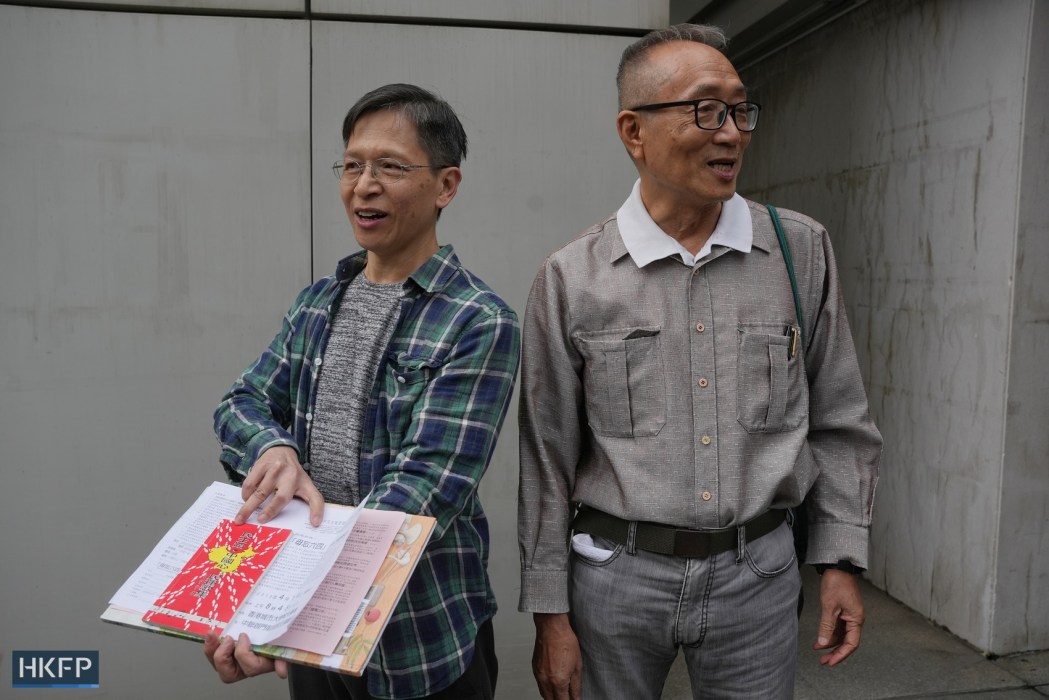A Hong Kong court has upheld the convictions of three activists over their refusal to comply with a request for information issued by the city’s national security police.

Chow Hang-tung, Tang Ngok-kwan and Tsui Hon-kwong, appeared at Hong Kong’s High Court on Thursday afternoon to hear the verdict of their appeal against their convictions and sentences.
The trio – who were part of the Hong Kong Alliance in Support of Patriotic Democratic Movements of China, which organised the city’s annual vigils to remember victims of the 1989 Tiananmen crackdown – were jailed for four and a half months last March after refusing to comply with a notice from national security police issued in August 2021.
During their appeal hearing last December, they argued that the alliance was not a foreign agent – as police had alleged – and therefore did not have to comply with the notice, which demanded information including personal information about standing committee members and staff.

Delivering her verdict on Thursday, High Court Judge Anna Lai ruled that their convictions should be upheld, saying that she agreed with the lower court’s ruling that the prosecution “need not prove the person or organisation is as a fact a foreign agent.”
On an argument heard during the appeal that the prosecution had not proven the Alliance had any relationship with any identifiable foreign governments or political organisations, or acted in the interest of any such bodies, Lai said: “[t]his matter has no relevance to any necessary element of the offence and is not an issue this Court is concerned with.”
“One cannot lose sight of the basic fact that the office is one of failing to comply with the Notice as required,” Lai wrote in her judgement.
“I agree that immediate custodial sentence is inevitable for deterrence effect. In this case the Appellants were clearly determined from the outset not to comply with the requirement of the Notices,” Lai said. She pointed to an open letter the Alliance presented to the police commissioner in September 2021 announcing their refusal to comply with the data request.

Lai also revoked Tsui and Tang’s bail “with immediate effect.”
After being sentenced last March, Chow, Tang and Tsui were granted bail pending appeal on conditions including not being allowed to give interviews or make speeches that might endanger national security. After hearing the terms, Chow rejected bail, saying she could not accept it “on grounds of freedom of expression.”
Arrests, the end of the Alliance
The Alliance, founded in 1989, organised annual vigils to mark the June 4 anniversary of the Tiananmen crackdown. It is estimated that hundreds, perhaps thousands, died when the People’s Liberation Army dispersed protesters in Beijing on June 4, 1989, ending months of student-led demonstrations.

Public commemorations of the crackdown are illegal in mainland China, but were permitted in Hong Kong, until police banned the vigil in 2020 and 2021 on public health grounds. There has been no vigil held in the city since 2019.
Members of the Alliance were arrested in September 2021 after refusing to comply with the information demand. It disbanded later that month, joining dozens of other civil society organisations that have shut down in the wake of the national security law.
Chow has been detained since her arrest pending trial over allegedly inciting subversion. The trial of Chow and other former Alliance members Albert Ho, and Lee Cheuk-yan is expected to begin no earlier than November.
Beijing inserted national security legislation directly into Hong Kong’s mini-constitution in June 2020 following a year of pro-democracy protests and unrest. It criminalised subversion, secession, collusion with foreign forces and terrorist acts – broadly defined to include disruption to transport and other infrastructure. The move gave police sweeping new powers and led to hundreds of arrests amid new legal precedents, while dozens of civil society groups disappeared. The authorities say it restored stability and peace to the city, rejecting criticism from trade partners, the UN and NGOs.
Support HKFP | Policies & Ethics | Error/typo? | Contact Us | Newsletter | Transparency & Annual Report | Apps
Help safeguard press freedom & keep HKFP free for all readers by supporting our team
























